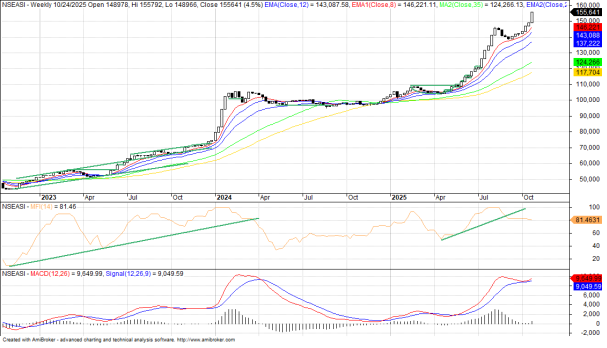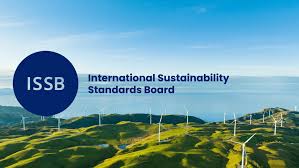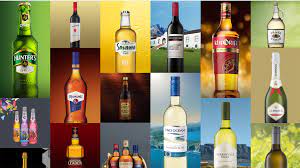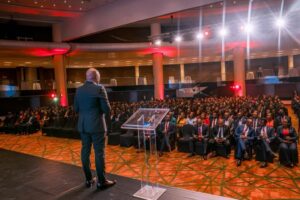
In this week’s episode of Marketplace Africa, CNN International travels to Nigeria where technology is being used to modernise the logistics industry. Despite being valued at $1.3 billion US dollars, the logistics industry in Nigeria faces challenges which it believes can be alleviated through modern advancements to technology.
Simon Emeje, Chairman of the Courier and Logistcs Management Institute, understands the importance of technology and tells CNN: “We need high security on our roads and in offices. We need gadgets that will assist every logistics company in doing the jobs they are doing.”
MAX, Metro African Express is an on-demand motorcycle hailing and delivery service which connects drivers and businesses to individuals.
Chinedu Azodoh, co-founder of MAX Delivery NG, tells host Eleni Giokos how MAX works: “Part of what we did was to create a proper structure and organization around specifically, hyper-local delivery, targeting really short, within city, types [of] delivery… We have something called the ‘God view’ in-house. It allows us to see everything across board – Where are the drivers, What are their battery lives, How fast are they moving, In what direction, What order are they working on? It’s essentially a bird’s eye view of everything happening on our system.”
Before MAX, companies were unable to track goods and because drivers didn’t use GPS, deliveries were more complicated as the CEO of Skincare Doll, Ujunwa Aniah Darrell, explains: “I had a logistics company before. The rider had an accident and I wasn’t even informed. And they went and delivered products that were bad to the client… If the riders don’t know the way, it does affect the business because you will see that delivery times take longer. But with MAX, I know that their riders usually have like a GPS on their app, so it makes the delivery a lot easier.”
Initiatives like MAX promise speed and accuracy, enticing other businesses into the new world of tech-driven deliveries. One such business is , which hopes to improve on the technology available but, instead of motorcycles, it connects truckers to businesses. The CEO and co-founder of Kobo360, Obi Ozor tells CNN: “Logistics is an old industry. It’s just that it’s very fragmented. So what we are doing is trying to use technology to drive efficiency in a well-established sector… The key problem is how do I get trucks to my factory so that I can deliver to my companies and distributors? So once they go on the app, without calling anybody, they see trucks that are available… of different sizes.”
The general manager of National, Logistics and Evacuation at Olam Grains tells Eleni Giokos about the level of efficiency Kobo360 has brought to the industry. “We can immediately, at the tap of [a] button request trucks and [a] response comes whether this truck is available or not. The moment the request is accepted [it] is supposed to be executed within six hours, the trucks are here, you load them, they get to the delivery points, they deliver. If there are any shortages, it will reflect immediately.”
While companies like MAX and Kobo360 have improved businesses through technology, Obi Ozor suggests infrastructure can’t be ignored. He tells CNN: “Bad roads are causing damages on the tires… It also disturbs the fleet partners economics so they’re spending a lot of money from average of five per cent now to about nine per cent per month on maintenance. Of course we are hoping that the government will solve some of those problems.”
CNN also meets Roland Ebelt, Managing Director of The La Casera Company, who tells Eleni Giokos about improvements they have made to create a more efficient business. La Casera, a Nigerian business, was founded in 2001 and produces a carbonated apple beverage. In order to stay competitive, La Casera has improved their packaging, as he tells CNN: “It was not only the uniqueness of the product, but also the uniqueness of the packaging. In the early 2000’s, PET packaging was not the norm in Nigeria. It was all in glass. So, La Casera developed the number one PET package.”
Speaking of La Caera’s future, Ebelt tells CNN: “We’re now localizing our supplies and producing 85 per cent of our requirements here in Nigeria. From the packaging, labels, to some of the ingredients that go into our product. There’s juice concentrate because this product is made with real apple juice, so that is coming from abroad because there’s no apples here in Nigeria, but everything else is local… We have a very comprehensive program to look at emerging consumer needs of beverage consumers here in Nigeria. We will continue now expanding our range over the next years. The philosophy is really to have products which are very distinctive, which are very unique in the market.”












